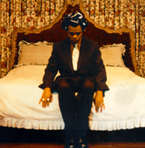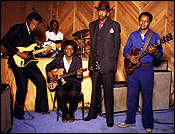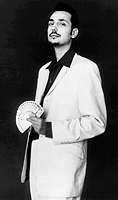by Lissa Townsend Rodgers, Jimmy Nations, and Anicee Gaddis
| |
 Chocolate Genius Chocolate Genius
"Black Music"
(V2/BMG)
Cover photos can often be misleading. "Black Music" features a picture of Marc Anthony Thompson, a.k.a. Chocolate Genius, sitting on a queen-size bed, out-of-focus in a natty brown suit. And you think, "this is another of those Maxwell, D'Angelo, love man things." And you wouldn't be wrong: you'd just be underestimating. Chocolate Genius does incorporate the atmospheric come-ons of those cats, but cuts it with a lyrical insight and rough edge in his voice that evokes Tom Waits. Mix that with a Tricky blend of guitars and samples, a little Sly Stone menace-funk, and a retro-psychedelia tendency that's kind of like Lenny Kravitz if he didn't suck, and you have--well, you have something a little more complex than your average makeout music. And while the songs are about relationships, the focus is on those between parents and children. The songs about love look at it through the rearview mirror--people who have separated but are bound by children or keep falling back on each other whenever they've been abandoned by someone else. Then, of course, there's the ones about drinking--"I lifted a glass, and it kicked my black ass to the sidewalk/and the last thing I heard, as my lunch hit the curb was your name"--which alternate between acoustic apology ("Hangover Five") and brooding, strutting jam ("Hangover Nine").
"Half a Man" is built on holy roller Hammond organ theatrics and the occasional big guitar buildup (think Bob Seeger) with rasped-out gospel-edged vocals. The song reappears as a hidden track at the end, revealing the moan of defeat behind the anthem of the proud loner in an acoustic-and-vocals mix so close you can hear him shifting in his chair. "Don't Look Down" alternates sultry spoken parts with female backing vocals over a mix of acoustic glissandoes and '70s wah-wah--good credentials for Chocolate Genius' admission to the "let's get it on" school, especially once the strings kick in. But rather than turning the lights down low, he's saying "You know, I've been thinking a lot about Jesus/Do you suppose that means he's been thinking a lot about me?"
Chocolate Genius earns the second half of his monniker with "My Mom," one of the most moving songs I've heard in years. Over churchlike organ and brushed drums, the narrator takes us back to his childhood home: "and that tree was a goalpost/that bathrobe it was a shroud/that closet, it was a phone booth/and that mirror was a crowd." Like a camera pulling in from a wideshot, we pass through more memories into the room where his mother is. Suffering from Alzheimer's or senility, she asks him the same questions five times, flips on "The Golden Girls," as her son moans, "She's my mom/and she don't remember my name." Fortunately this is followed up by the bouncy, Beck-ish "Safe and Sound," on which loping bass, sparkling guitar riffs, and perpetual tambourine move the dialogue of a visit to somebody's baby's mama, concluding in a surprising burst of marching bands and hollering.
Still, despite the musical accomplishment of "Black Music," the love man label may still hang on Chocolate Genius. He's got that afro, for one. And, when recommending this album, my friend Michelle (the Cleopatra Jones of the LES) gave me several reasons why it was worth a listen and then simply stated: "This record makes me wanna be his girlfriend." And that is the ultimate test of a love man, isn't it?--Lissa Townsend Rodgers
--Lissa Townsend Rodgers
|
 |
 Chocolate Genius
Chocolate Genius
"Black Music"
The Fieldstones
"Memphis Blues Today"
Dimitri from Paris
"Sacrebleu"
|
 |
 July 20
July 20
MC Lyte, Fastball, Marc Ribot
July 6
Amon Tobin, Pullman, Jesus and Mary Chain
June 16
Mark Shim, Brian Blade, RL Burnside
June 1
Jeff Buckley,
Massive Attack, Tricky, The Lounge Lizards
May 7
Eric Reed, Kim Lenz
April 21
Solex, Killah Priest
|
|
|
 The Fieldstones The Fieldstones
"Memphis Blues Today"
(Hi-Tone)
When I picked up this CD, I was looking for something different than the overplayed "Chicago" style blues. Being from Memphis, I had a feeling "Fieldstones: Memphis Blues Today" wouldn't let me down, and it didn't.
With all due respect, the Fieldstones were to Memphis Blues what Muddy Waters was to Chicago. They have carried a long line of tradition that goes back to the 1920s. Though the music is updated, you can still hear its roots in the "full band" sound, marked by deep rumbling bass, funky guitar riffs, and gritty vocals, The Fieldstones were featured every Saturday night at the famous night spot Green's Lounge, which is no longer standing due to a fire last year. With nothing but a sign outside this south Memphis neighborhood bar reading "Live Blue Sat. Nite," the band played their Stax Soul-influenced music for a locals-only crowd. "Memphis Blues Today" was first released by Dr. David Evans for the High Water Recording Co. (a division of the University of Memphis in 1983) following two 45's in 1981. The '80s weren't such a great time for the blues, so it seemed Memphis' best keep secret would stay that way. Today, with the millenium approaching, it is a different story--people are snatchin' & grabbin' all the roots music they can get.
The first track "The Fieldstones" is a theme song in which Joe Hicks, the drummer and lead vocalist (who carved his drum sticks out of an elm limb), tells you about each band member and gives props to their prowess. It's a soulful tune with a great guitar riff that keeps it grooving. "Dirt Road" and "Please Don't Put Me Outdoors" are classic slow, pleading blues sung by Willie Roy Sanders, the second lead guitarist. Songs like "The Thing," "The Squeeze," and a cover of Clarence Carter's "Looking for a Fox" are the basis of their soul sound, as well as the best tunes on the CD.
Lois Brown, the latest in Memphis' long line of female blues musicians, plays bass and is primarily responsible for the band's solid sound, due to that fact she plays with her thumb and cranks the bass frequency up on her amp to give her a soft, full sound. Wordie Perkins and Willie Sanders battle out riffs in the two-guitar work that is tradition in itself for the Memphis bands. Organist Bobby Carnes is barely audible on the album, but is quite effective in "filling up" the sound with sustained chords.
There are plans to release another CD, "Mud Island Blues," documenting the contributions of former members Clarence Nelson & Little Appelwhite. Though mostly retired now, the Fieldstones can still be heard playing the bars and juke joints of Memphis sitting in with other bands--and there are also reports of rebuilding Green's Lounge. Pick this one up if you like a little soul in your blues: it's a bit of American musical history as well as a down & dirty good time.
--Jimmy Nations
 Dimitri from Paris Dimitri from Paris
"Sacrebleu"
(Atlantic)
The ultimate bedroom-lounge album, blending burlesque boudoirisms over a subtle techno beat, Dimitri from Paris' "Sacrebleu" is actually a lot of fun. What with the recent infusion of hip French dance-pop--see the Versaillian duo Air--Dimitri may just happen to be from the right place at the right time. But his creativity and appreciation for experimentation in "bedroom culture"--even if the end product sounds like just another clever variation on the kitsch trip-hop theme, with some salsa beats figured in--do come through. Prior to his reputation as the French DJ with the petite goatee and black beret, Dimitri's resumé included remix wizardry for the likes of Bjork and the Brand New Heavies.
Overall, "Sacrebleu" is a cute album with enough of the occasional hard house beats to make you want to shake your thang. The sexy French vocals/futuristic Moog synthesizer combination has been done before, though it seems to sound better when an authentic francophile is back there fiddling with the knobs. Dimitri plays a lot of his own instruments, including his imaginary "stylophone" which seems to suit his drageur image to a perfect T. There are also some nice solos on grand piano and flugelhorn by Roger and Frédéric Poulet. "Reveries" is the prettiest song on "Sacrebleu": it's moodier, more Tricky-esque and less tongue ‘n' cheek than the others. "Back in the Daze"--a plain ol' straight ahead house tune--is good in that it aims at maintaining a solid funky beat, without fretting about being coy, existential, or French. "Dirty Larry," the one purely instrumental track, compares itself to a '60s spy-show theme song, in this case for the fake TV series "Inspector: Sacrebleu." You can guess who the title character is modeled on. I imagine he'd be wearing a silk shirt, an ascot, and have a cigarette holder dangling from the corner of his grin.
--Anicee Gaddis
Send feedback here.
|
|
|

